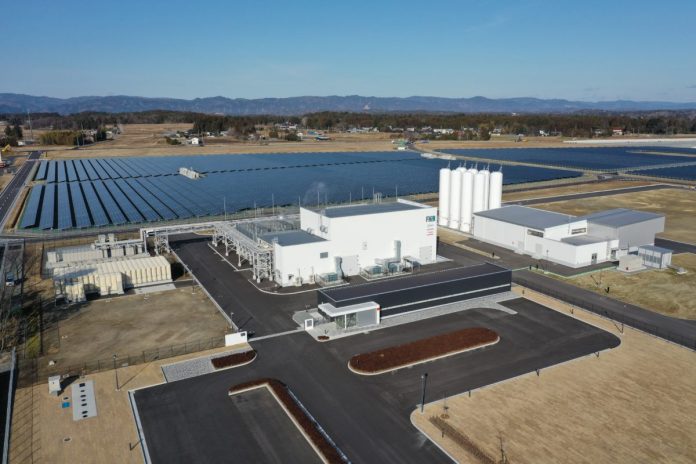Japanese conglomerate Toshiba Corporation has announced its Fukushima Hydrogen Energy Research Field (FH2R) project, on which construction began in July 2018, is operational.
The solar-powered 10 MW hydrogen plant in Namie town, Fukushima prefecture, is said to be able to produce 1,200 cubic newton meters (Nm) of hydrogen per hour.
The intermittent nature of solar generation prompted Toshiba to design the facility to be able to adjust to supply and demand in the grid, the company said.
“Hydrogen produced at FH2R will also be used to power stationary hydrogen fuel cell systems and to provide for … mobility devices, fuel-cell cars and buses and more,” Toshiba added. “The most important challenge in the current stage of testing is to use the hydrogen energy management system to achieve the optimal combination of production and storage of hydrogen and power grid supply-demand balancing adjustments without the use of storage batteries.”
Solar power
The plant is being powered by 20 MW of solar generation capacity as well as grid power. The hydrogen generated is being transported in trailers and hydrogen bundles to users elsewhere in the prefecture as well as the Tokyo metropolitan area and other regions.
In early January, Toshiba commissioned the H2One Station Unit, an energy storage system producing hydrogen at the Toyama City Environment Center in Toyama prefecture. According to the company, that kind of installation can be deployed easily and operated by customers such as factories, harbors, airports and bus depots. A similar facility was deployed at the end of December in Tsuruga City, in the Hokuriku region.
Toshiba’s energy system and solutions business began a demonstration of an holistic hydrogen supply chain for electricity generation in May 2018.
The multinational had announced in February 2016 it would place more emphasis on its energy and storage businesses following an accounting scandal which had prompted a restructure and losses of around $6 billion in 2015.






